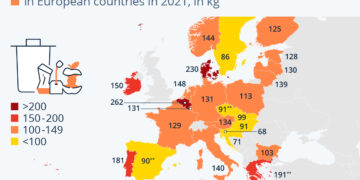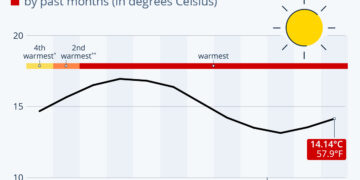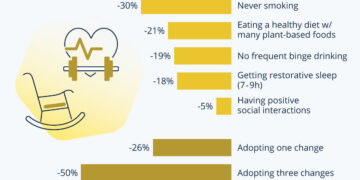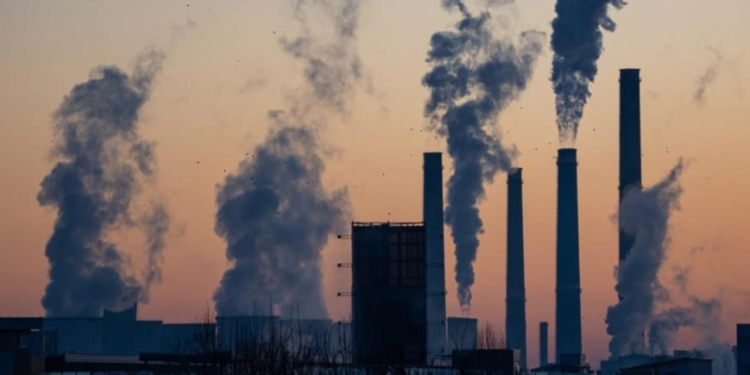In recent years, a significant shift has been observed in China’s carbon emissions trajectory. The world’s largest emitter for most of the past two decades appears to be on the verge of plateauing its carbon output, a development with far-reaching implications for global climate action and developing nations like Nigeria.
China’s Emissions Plateau:
According to a study published in Nature Geoscience, China’s annual carbon emissions growth rate has decreased significantly, from 10% during the 2000s to less than 1% per year on average since 2010 [1]. This slowdown is attributed to several factors:
1. Structural changes in the economy, moving away from heavy industry towards services and high-tech manufacturing.
2. Improved energy efficiency across various sectors.
3. A substantial increase in renewable energy capacity.
The International Energy Agency (IEA) reports that China’s carbon emissions fell by 8% in the first quarter of 2022 compared to the same period in 2021, marking the largest absolute decrease in emissions by any country during that time [2].
Global Implications:
China’s emissions plateau is crucial for global climate goals. As the world’s largest emitter, accounting for about 27% of global greenhouse gas emissions, any significant change in China’s emissions has a substantial impact on global climate trajectories [3].
Relevance to Nigeria:
Nigeria, as Africa’s largest economy and most populous nation, can draw several lessons from China’s experience:
1. Economic Transition: Like China, Nigeria aims to diversify its economy away from oil dependence. China’s success in reducing emissions while maintaining economic growth provides a potential model for Nigeria.
2. Renewable Energy Investment: China has become a global leader in renewable energy. In 2020, it accounted for about 50% of the world’s growth in renewable energy capacity [4]. Nigeria, with its abundant solar and wind resources, could benefit from increased investment in renewables, potentially leveraging Chinese expertise and technology.
3. Climate Policy: China’s emissions plateau is partly due to strong policy measures. Nigeria’s recent Climate Change Act (2021) sets a framework for achieving low greenhouse gas emissions. Implementing and enforcing such policies will be crucial for Nigeria’s climate action [5].
4. International Cooperation: China’s role in global climate negotiations has evolved with its emissions trajectory. Nigeria, as a key African nation, could play a more prominent role in international climate discussions, advocating for the needs of developing countries.
5. Technology Transfer: As China moves towards greener technologies, there’s potential for increased technology transfer to countries like Nigeria, aiding in leapfrogging to cleaner energy solutions.
Challenges and Opportunities:
While China’s emissions plateau offers hope, it also presents challenges. Developing countries like Nigeria may face pressure to curb their emissions growth even as they strive for economic development. However, this also presents opportunities for sustainable development pathways.
Nigeria’s former Minister of Environment, Mohammad Mahmood Abubakar, has emphasized the country’s commitment to reducing greenhouse gas emissions by 20% by 2030 [6]. Achieving this goal while ensuring economic growth will require careful planning, international support, and innovative solutions.
China’s carbon emissions plateau marks a significant milestone in global climate action. For Nigeria and other developing nations, it provides both lessons and challenges. As the world moves towards a low-carbon future, Nigeria has the opportunity to chart a sustainable development path, learning from China’s experience while addressing its unique circumstances and needs.
References:
[1] Guan, D., et al. (2018). Structural decline in China’s CO2 emissions through transitions in industry and energy systems. Nature Geoscience, 11, 551-555.
[2] IEA (2022). Global Energy Review: CO2 Emissions in 2022.
[3] Climate Watch (2020). Historical GHG Emissions. World Resources Institute.
[4] REN21 (2021). Renewables 2021 Global Status Report.
[5] Federal Republic of Nigeria (2021). Climate Change Act, 2021.
[6] Federal Ministry of Environment, Nigeria (2021). Nigeria’s Nationally Determined Contribution – 2021 Update.


















![Antimicrobial Resistance [AMR] in Hausa](https://healthtoday.com.ng/wp-content/uploads/2024/02/antimicrobial-resistance-AMR--360x180.jpeg)


























